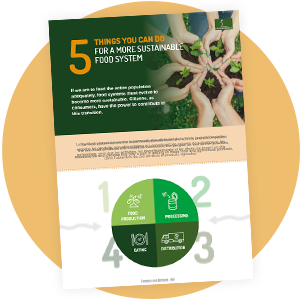The food we choose and the way we consume are critical for the necessary transformation towards a more sustainable agri-food system. World Food Day 2021 focuses on this theme and aims to raise awareness and involve citizens.
“Our actions are our future”: these are the words chosen by the United Nations World Food Day 2021 to underline the importance of food choices and consumption patterns for our health and for the planet. Because these choices and these patterns have an impact on the way that food systems function. In this way, the UN seeks to make us all aware of the role we can play in the evolution towards a sustainable food system, one that can provide us with a sufficient variety of nutritious and healthy foods. In other words, the future of food is in everyone’s hands.
World Food Day: time for action
The way in which we produce, consume and waste food exacts a heavy toll on our natural resources, the environment and the climate. Agri-food systems, which employ 1 billion people worldwide, contribute to climate change, which in turn puts pressure on food production in some countries. There is an urgent need to move towards more sustainable systems, and the FAO is promoting agroecology. On World Food Day, the FAO also calls on cities to become “greener”, and to create individual or collective vegetable gardens. This is also a way to promote a healthier diet that includes more vegetables and other plant-based foods.
Find out how to plant a fast-growing, natural vegetable patch
The power of the consumer
The food we choose, the way we prepare, cook, store and dispose of it, all have an impact on the agri-food system, and give the consumer real power: we can all be actors of change by buying healthier food (which means more plants), by buying less food with a high carbon impact (such as meat and processed meat), and by shopping for food that is local and seasonal. These choices help to shape supply, which in turn influences production to better direct it towards meeting real nutritional needs while limiting its environmental impact. Consumers also have the power to inform themselves about how the food they buy is produced, and they have the power to limit food waste in order to move towards a sustainable diet.



 Peas
Peas  Millet
Millet  Vegetable garden: growing celeriac
Vegetable garden: growing celeriac 










